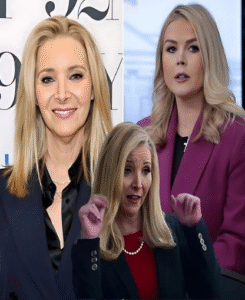Lisa Kudrow’s Viral Impersonation: Satire, Shockwaves, and the Politics of Performance
In a moment that blurred the line between parody and prophecy, Lisa Kudrow—best known for her role as the delightfully eccentric Phoebe Buffay on Friends—has reignited Hollywood’s love affair with political satire. Her jaw-dropping impersonation of Karoline Leavitt, Press Secretary to President Donald Trump, has not only gone viral but sent shockwaves through the entertainment and political spheres alike.
The impersonation, which surfaced in a resurfaced clip from the Netflix mockumentary Death to 2020, was originally filmed years ago. Kudrow portrayed Jeanetta Grace Susan, a fictional “non-official spokesperson” for the Trump administration. But in 2025, the character’s uncanny resemblance to Leavitt—both in tone and rhetoric—has turned the satire into something eerily prescient.
The Performance That Sparked a Firestorm
Dressed in a red dress, blue blazer, and a string of pearls, Kudrow’s character delivered a monologue that felt ripped from today’s headlines. She dismissed the impeachment proceedings as “baseless,” mocked the existence of Ukraine, and accused the media of “fabrication and fantasy.” The delivery was sharp, absurd, and disturbingly familiar.
What made the impersonation so explosive wasn’t just Kudrow’s comedic timing—it was the timing of the clip’s resurgence. As Leavitt continues to make headlines for her combative press briefings and controversial statements, Kudrow’s parody has become a mirror held up to the current political climate.
Social media erupted. “So frightening that I had to watch it twice before I realized it was Lisa Kudrow and not Karoline Leavitt,” one user wrote. Another added, “Just like Leavitt, always backtracking. Good work, Lisa”.
Satire as Social Commentary
Kudrow’s impersonation is more than a comedic sketch—it’s a masterclass in satire. By exaggerating the rhetorical tactics of political figures, she exposes the absurdity and danger of misinformation. Her character’s denial of documented facts, gaslighting of the public, and performative outrage reflect real-world strategies used to manipulate public perception.
Satire has long been a tool for truth-telling. From Jonathan Swift’s A Modest Proposal to Tina Fey’s impersonation of Sarah Palin, comedians have used humor to critique power. Kudrow’s performance joins this tradition, offering not just laughs but insight.
In an era where political discourse is increasingly polarized, satire becomes a bridge—a way to engage audiences across ideological divides. Kudrow’s impersonation doesn’t just mock—it invites reflection.
Hollywood Reacts: Applause and Anxiety
Hollywood’s response has been swift and divided. Many actors and comedians praised Kudrow’s boldness. “She nailed it,” tweeted Sarah Silverman. “Satire at its finest.” Others expressed concern about the blurring of fiction and reality. “It’s funny until you realize how close we are to the parody,” said one anonymous showrunner.
The impersonation has also reignited debates about the role of celebrities in politics. Should actors use their platforms to critique public figures? Or does this risk further politicizing entertainment?
Kudrow, for her part, has remained silent. She hasn’t commented publicly on the impersonation’s viral resurgence, allowing the performance to speak for itself. And speak it does—with wit, wisdom, and a touch of wicked humor.
Karoline Leavitt: The Unintended Muse
Karoline Leavitt, the youngest-ever White House Press Secretary, has become a lightning rod for controversy. Her unapologetic defense of President Trump, combative exchanges with journalists, and frequent use of social media have made her a polarizing figure.
Kudrow’s impersonation, though not originally intended to mimic Leavitt, has become a cultural shorthand for her style. The parallels are uncanny: the cadence, the deflection, the performative certainty. It’s satire that feels like documentary.
Leavitt has not responded to the impersonation, but her supporters have called it “disrespectful” and “Hollywood elitism.” Critics, however, see it as a necessary critique of political theater.
The Power of Parody in a Post-Truth Era
In today’s media landscape, where misinformation spreads faster than facts, parody serves a vital function. It disarms, disrupts, and demands attention. Kudrow’s impersonation doesn’t just entertain—it educates. It forces viewers to confront the absurdity of political spin and the fragility of truth.
The viral clip has sparked renewed interest in Death to 2020, with many viewers revisiting the mockumentary to see how much of its satire has become reality. The show’s creators, Charlie Brooker and Annabel Jones, known for Black Mirror, have long explored dystopian themes. Kudrow’s performance is a reminder that dystopia isn’t always distant—it can be disguised as daily news.
A Cultural Moment Worth Remembering
Lisa Kudrow’s impersonation of Karoline Leavitt is more than a viral video—it’s a cultural moment. It captures the tension between comedy and crisis, between entertainment and ethics. It reminds us that laughter can be a form of resistance, and that parody can reveal truths that official statements obscure.
In a time when political figures often seem like caricatures, Kudrow’s satire holds up a mirror. And what we see reflected is both hilarious and haunting.
Conclusion: The Echo of Laughter
As the clip continues to circulate, one thing is clear: Lisa Kudrow has once again proven that comedy is not just about timing—it’s about truth. Her impersonation of Karoline Leavitt may have thrown Hollywood into chaos, but it has also sparked conversation, reflection, and a renewed appreciation for the power of performance.
In the end, Kudrow’s parody is not just a joke—it’s a jolt. A reminder that in the theater of politics, the most revealing lines may come from the script of satire.


